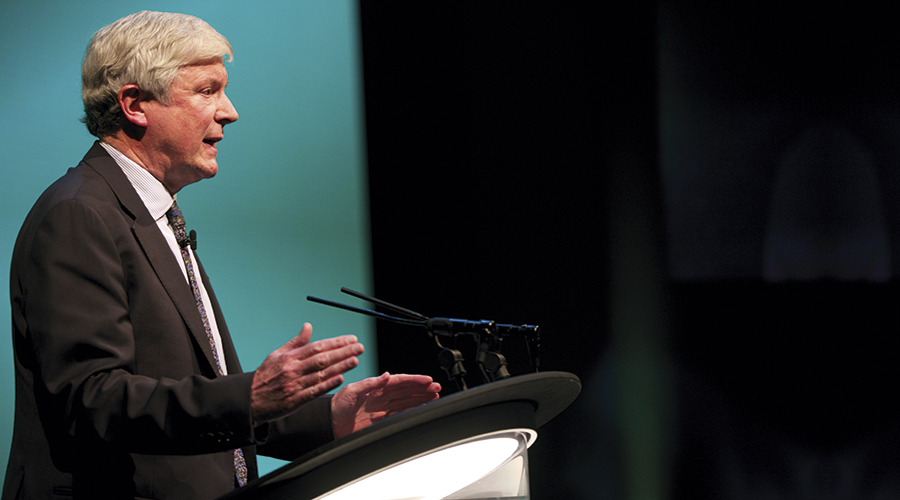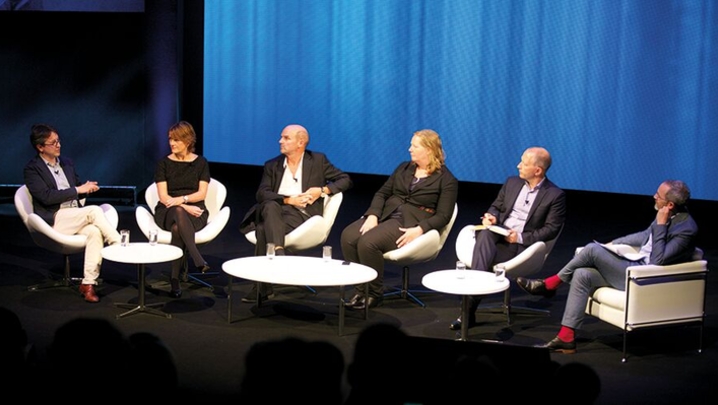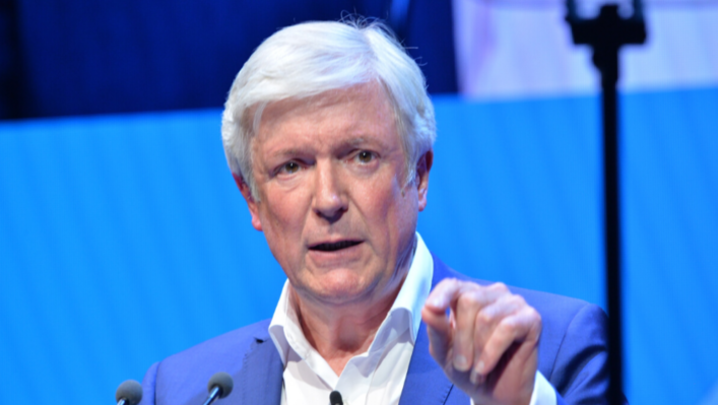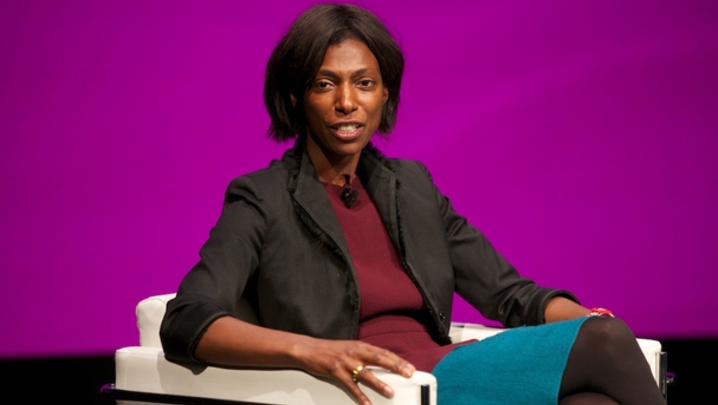Cambridge Convention 2015 Session Ten: Tony Hall warns that the UK’s worldwide reputation for creating great TV shows will be compromised unless the long-term decline in investment is reversed
Today, I want to talk about one thing: content, programmes – the reason we’re all here. In this country we have a really vibrant creative ecology of broadcasting. It’s a great national success story.
But the question I want to talk about this afternoon is whether one part of that ecology will continue. Will we carry on making content to the degree and quality that we do now?
I’m concerned that, in all the arguments and debate about the BBC’s Charter, in a decade’s time we might look back and say that we missed something crucial – a big trend.
And that big trend may well be the slow and recent decline in television production in Britain. In this job, and my last one, I’ve been a huge believer in the power of Britain’s creative industries. In my lifetime, I have seen the growth of British music as a huge global success and also the success of British fashion, literature, design, musicals, architecture, art, video games – and, of course, broadcasting.
Fewer countries are in better creative shape than the UK. There are not many industries where the UK goes toe-to-toe with the US. But the creative industries do.
The big question for us is this: can it last? There is a long-term decline in the amount of UK-originated content. Ofcom’s review of public service broadcasting last year identified this as a problem.
Between 2008 and 2013, excluding sport, total investment in new, first-run, original television content in the UK fell in real terms – from £2.6bn to £2.4bn.
Over the same period, investment in original British programmes by our public service broadcasters fell by around 15%.
Pay-TV channels have made up a bit of the difference. Led by Sky, they have made some brilliant programmes, such as Fortitude, Critical and The Enfield Haunting.
But this increased investment made up for less than a third of the overall loss. Partly as a result, international revenues for UK independent producers fell in 2014, the first fall we’ve seen in seven years.
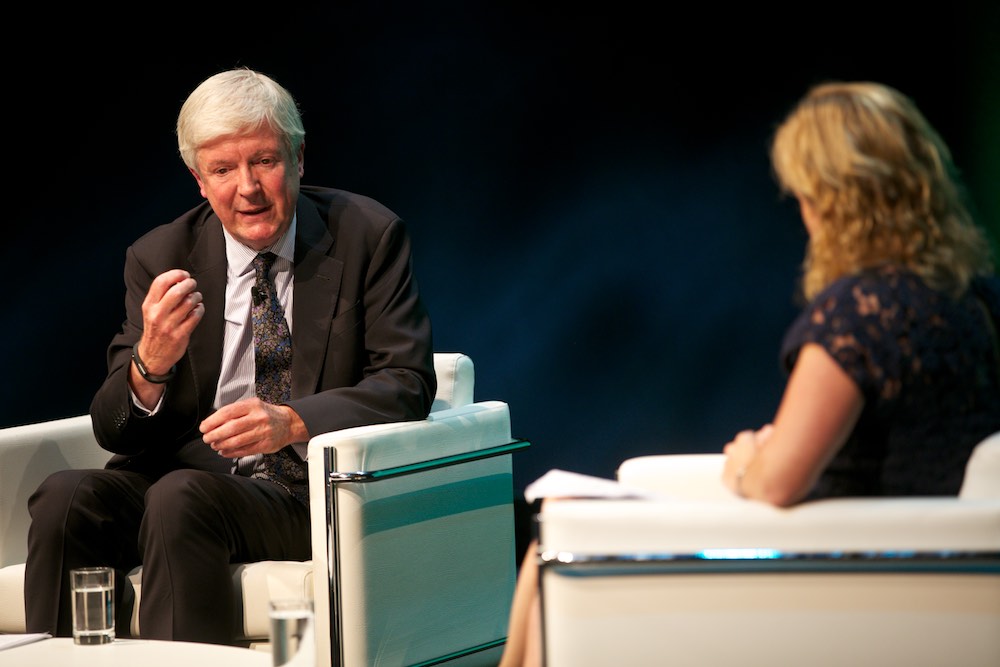
As the BBC’s spending has fallen, overall investment in original British content has gone down. Whatever the other arguments may be, this is what the impact of a smaller BBC looks like.
Will Netflix or Amazon produce the range and volume of British programmes to make up the difference? Will they make the British programmes that aren’t being made?
I will apply a very British test. It hasn’t happened yet. Over the past few years, the volume of new UK content broadcast each year outside of news and sport has gone down by around 13% – that’s 2,000 hours.
In that time, Netflix and Amazon have produced only a few hundred hours of original content between them – across the world. Almost all of it made in the US, not the UK.
My point is that these new businesses are unlikely to address the Britishness problem and unlikely to address the decline in original content for the UK.
This is a problem for all of us, but I’m also certain that the BBC needs to be part of the solution. We are the largest single investor in British creative ideas and talent.
The licence fee accounts for around 20% of TV revenues, but around 40% of the investment in original British programmes. Each year, we invest well over £2bn of licence-fee income directly into the UK creative sector.
Around half that money is invested outside of the BBC, with £450m in small creative businesses. And here’s the simple truth, which I am saying not for political reasons, but just because it is true and hard to avoid.
Enders Analysis summarised it well last week: for every £1 cut in BBC television funding, first-run UK content investment goes down by at least 49p. In other words, the market would replace only half of lost licence-fee investment.
This raw fact means that we have to organise ourselves better in order to meet the challenge of British content at a time of greater and greater competition.
So the first thing that we need is a secure BBC. And that starts with our funding settlement. The budget agreement that we have with the Chancellor and Secretary of State delivers that – though it will not be without its challenges and painful choices.
Inevitably, we’ll have to either close or reduce some services. It’s tough, but, with all that said, we welcome the Government’s commitment to stick to the agreement.
By itself, though, the agreement won’t restore the fall in original British content, let alone allow it to grow. That’s why we think the Government’s option for a household fee merits further consideration, because it could bring new investment and safeguard the BBC’s support for the creative economy for the long term.
That’s why, for me, reforming the BBC to be a leaner, simpler organisation, a process I began in July, is so important. That’s why I also want to open the BBC to become – even more – Britain’s creative partner, to become a platform for this country’s incredible talent.
We rely on the independent sector for some of our best-loved programmes – from Happy Valley to Poldark. Our partners come in all shapes and sizes. But the market has changed. At the top end, there are big, mature companies reaping the rewards of global success. But for some smaller companies, business remains difficult in a tough economic environment.
And we want to help. To add to some of the things we’re already doing. But we also need to keep the BBC itself as one of the world’s great programme makers, able to compete on the global stage.
Look at some of the recent deals. Netflix securing the rights to make the biopic, The Crown – £100m apparently – and Amazon signing the Top Gear team for a reported £160m.
The cost of the best content is growing. So, if we want to continue to create great programmes and experiences for audiences, we need to be able to choose the best ideas – from both indies and in-house.
For that to be a real choice, we have to have a thriving in-house team. That’s what motivates our proposals to create BBC Studios.
And it brings a second benefit – for in-house shows, we own the rights to that intellectual property. This means that all the commercial returns are put back into the BBC. This means we can invest more in programmes.
Owning intellectual property allows the BBC to innovate. We couldn’t have launched iPlayer – or BBC Store next month – without that critical mass of programmes made by the BBC as a starting point. And it will continue to be vital as we develop new platforms and services.
The creation of BBC Studios is an essential part of our strategy. BBC Studios will have the values and quality of the BBC – a mission to inspire audiences at home and around the world with bold British creativity.
It will find and nurture the next generation of British on-screen and back-stage talent in drama, comedy, science, natural history and more. It will be distinctive in the market. It will delight in range and specialism, making the full range of genres and not just those with the most commercial appeal. It will operate across the UK.
It will ensure the full value of BBC-made content is returned to the licence-fee payer.
But please note this, it will be vital: it will stimulate the sector, but it will not be dominant. There must be a level playing field.
We estimate that it will have a share of under 15% of the UK production market. And it will operate at arm’s length. There will be no cross-subsidy from the licence fee. And it will be stringently and independently regulated.
Finally, in today’s financial climate, everyone is being asked to deliver more for less, so we need to have a commercial strategy where BBC Worldwide delivers as much as possible back into public-service programmes.
It’s what we already do – it’s what’s made BBC Worldwide so successful. Let’s not forget that we have built a world-class and growing media business. It has a £1bn turnover, which gave the BBC a record return of £226m last year. Critically, this has supported not only the BBC but also the hundreds of independents who partner with Worldwide in production and distribution.
But this model only works if BBC Worldwide is thriving. It is an indivisible part of the BBC. Or, to look at it through another lens: without BBC Worldwide, the licence fee would be £10 higher.
That’s why any proposal to carve out BBC Worldwide from the BBC doesn’t make economic sense. While every major global player is creating a more integrated system, it would make no sense for us to go the other way and break up a system that is delivering returns that are essential to support public-service programmes.
It would make it harder for the BBC to diversify its revenues still further. And it would diminish one of the best shop windows to the world for British talent and programme-makers – whether at the BBC or from independents.
Over the next few years, we intend to work with global partners to grow Worldwide further, taking advantage of the demand for British programmes and new digital opportunities.
Overall, we think that our plans will increase commercial returns from Worldwide to the BBC to £1.2bn over the next five years – more than 15% higher than the returns of the previous five years.
We will strengthen the country’s global voice. We will give our country’s talent and creativity a global stage. The Britishness of British broadcasting is under challenge. It’s obvious and measurable. The Britishness of British broadcasting isn’t something that just happens. Global markets won’t take care of it. We have to.
I want to see a British TV ecology in the next decade that is even better than it is today. That supports a high level of investment in a wide range of high-quality programmes and new digital content – home-grown for British audiences.
And which keeps Britain punching above its weight around the world and which keeps making programmes that we all love, enjoy and watch together.
This is an edited version of BBC Director-General Tony Hall’s Keynote speech. For the full version go to: www.bbc.co.uk/mediacentre/speeches/2015/tony-hall-rts. The session was chaired by Jane Martinson, Media Editor, The Guardian, and produced by Martin Stott.
Question & answer
Reporting by Steve Clarke
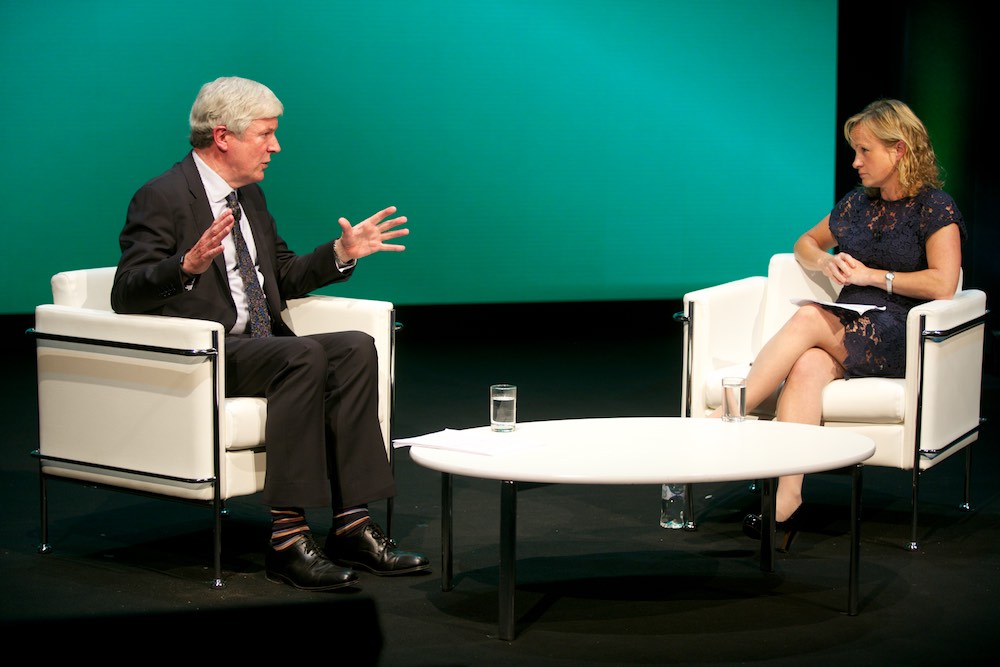
Q. Jane Martinson: I’d like to take you back to that day in July when the Secretary of State called you and said: “I am going to take £700m from your budget.” Do you think you played it right over the next few days?
A. Tony Hall: I made it absolutely clear what a £700m impost on the BBC from 2017 would mean.… We had a series of meetings, one with the Chancellor and the Secretary of State and the Cabinet Secretary, where I outlined what it would mean.…
On the Friday [3 July 2015] the Chancellor said, “Come and see me” and we went through a list of things.
What we had to weigh up then was that we had a licence fee aligned to CPI. That’s something I feel is really important. [Also] phasing in of the over-75s’ licence fees over a couple of years. The Chancellor understood the pressure we were under. [Plus] an end to top slicing the licence fee to pay £150m for broadband roll-out… and modernisation of the licence fee within a year.
Those are big things to have got.…This is a better deal than the one in 2010 by a long chalk.
Q. Jane Martinson: You talked in your speech about hoping that they’ll stick to the agreement. Did you get a commitment that increases in the licence fee would be linked to inflation?
A. Tony Hall: Yes, barring one thing: if there is a major change in the scope or scale of the BBC.
Q. Jane Martinson: Are you clear what a major change would look like?
A. Tony Hall: We all know what a major change would look like. It’s not moving the news from 10:00pm. It’s something like stopping doing local radio or something like that.
Q. Jane Martinson: Do you think that John Whittingdale was stupid to have mentioned moving the BBC’s Ten O’clock News?
A: Tony Hall: He’s Secretary of State, he can say what he wants… The most important voices here are the audiences’. The audiences at 10:00pm for our news are really, really strong. It works and I therefore don’t see why you would want to play around with that.
But [with] the process that the Green Paper has set going… it is really important for us to demonstrate that we are distinctive and that [programmes] have a BBC quality to them. When you see Charlotte Moore’s ideas for BBC One this autumn and winter, you’ll say that this is a BBC One that we can be really proud of.
Q. Jane Martinson: Is it right to put The Voice against The X Factor?
A. Tony Hall: I believe in The Voice… The competitive Saturday-night schedule has always been a feature of BBC and ITV. Audiences are well served by our successful broadcasting ecology… We have something here [in the UK] that really works.
Q. Jane Martinson: Will the creation of BBC Studios actually save money?
A. Tony Hall: I can’t tell you how much. That’s what Peter Salmon and I will be talking about over the next bit.
Q. Jane Martinson: So it is not about saving money?
A. Tony Hall: We will save money wherever we can… This is about the future of intellectual property at the BBC.
Q. Jane Martinson: You’ve been described as a brilliant peacetime general at a time of war. Are you up for the fight of the next 18 months?
A. Tony Hall: Yes, absolutely.… The reason I came back to the BBC when Chris Patten invited me… I knew exactly what I was doing… [is that] I really believe in being ambitious about the BBC.
Questions from the floor:
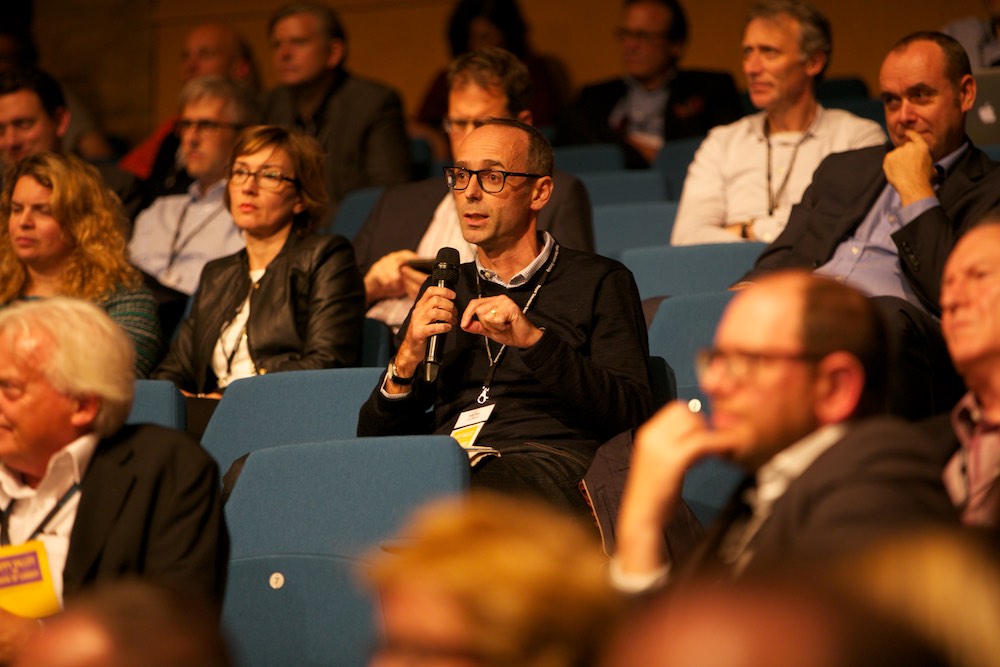
Q. Conrad Roeber, Prospero Strategy: The BBC already competes with social-media platforms for time, increasingly they might start competing with the BBC as service providers.…
Why has it taken the BBC so long to achieve so little in terms of personalisation?
A. Tony Hall: We are too slow in using data. That’s the brunt of what you are saying. I would agree with you.
[BBC Trust Chair] Rona Fairhead has also said that... if you give us your data about your preferences, we won’t use it to sell you anything. We will use it to show you the broad range of programming that is available on the BBC, and other content as well.
This is a huge opportunity for us to act on behalf of the people who pay for us… I am really keen that we steam ahead with My BBC.
Q. John McVay, CEO Pact: Can you confirm that the BBC is not seeking the removal of the terms of trade?
A. Tony Hall: Can I correct something you said this morning: we haven’t been lobbying. The thing that I absolutely want to work with you and others on is BBC Studios. That’s top of my mind for all the reasons I have outlined in my speech.

